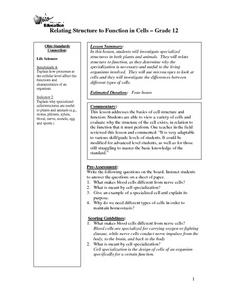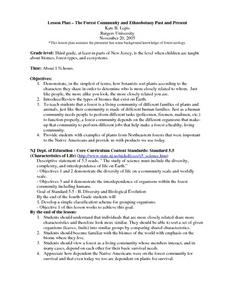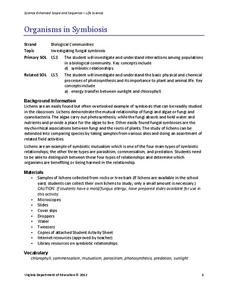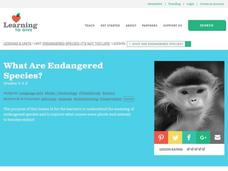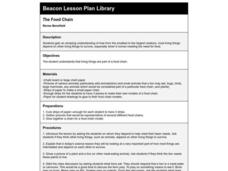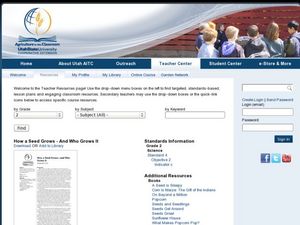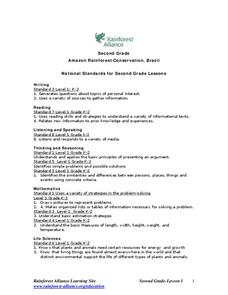Curated OER
Bird Up
Third graders identify basic physical and behavioral characteristics of birds and how they adapt to their environments. To organize and share scientific information with peers. They discuss similarities and differences among birds....
Curated OER
Animal Adaptations
Students expand their knowledge of animal features and behaviors that can help or hinder their survival in a particular habitat. They participate in classroom discussions and visit a website to research animals
Curated OER
Relating Structure to Function in Cells
Twelfth graders investigate specialized structures in both plants and animals. They relate structure to function, as they determine why the specialization is necessary and useful to the living organisms involved. They use microscopes...
Curated OER
Sedimentary Rocks
Fourth graders discuss the basic properties of rocks, the processes
involved in the formation of soils, and the needs of plants provided by soil. They write descriptions in their Science journal and identify and discuss each type of...
Curated OER
Teaching Kids about the Environment
Fifth graders identify the species of plants and animals found in an environment. They compare these findings to plant and animal species found in an unlike environment. Students acquire and compare soil samples from the two sites chosen.
Curated OER
Lesson 3: Nutrition, Labeling and Packaging
Students explore basic nutrition concepts to help them select healthy diet, evaluate food intake, discuss major food labeling issues, design labels for food products, examine history of food packaging development and how packaging...
Curated OER
The Forest Community And Ethnobotany Past And Present
Students describe a forest as a living community. They determine members interact, and in many cases, depend on each other for their basic survival needs. They investigate how dependent the Native Americans were on the forest...
Virginia Department of Education
Organisms in Symbiosis
Searching for an activity that allows emerging biologists to explore symbiosis up close and personal? Pupils collect samples and view lichens through a microscope and conclude with a discussion about the relationship they have...
Curated OER
Exploring Ecosystems
Fourth graders create an ecosystem as a class. They have already produced smaller ones. They use a pond or something similar on school grounds to meet the needs of certain plants and animals of their ecosystem. Specifically created will...
Curated OER
What Are Endangered Species?
Students explore the concepts of endangered and extinct animals. In this animal protection lesson, students discuss and define the words endangered, extinct, and habitat. Students share why they think it is important to protect...
Curated OER
Classifying Living and Non-Living Objects
Students investigate living organisms and define the properties of a living species. In this life characteristic lesson, students examine plants in their class and discuss whether or not they are alive. Students create a...
Curated OER
The Food Chain
First graders explore how most living things, big and small, need food for survival.
Curated OER
Learning From Leaves: From Observation to Inference
Students examine the adaptation of plants to their environments. They analyze and observe the structure, shape, and internal structure of various leaves, and make inferences about the structures.
Curated OER
VERTEBRATES
Seventh graders describe the main characteristics of warm-blooded vertebrate animals. They compare and contrast the two different groups of warm-blooded vertebrate animals by looking at external, reproductive, and growth characteristics.
Curated OER
How a Seed Grows: And Who Grows It
Second graders explore botany by viewing video clips in class. For this seed growth lesson, 2nd graders identify the types of seeds that grow specific plants and what the optimal conditions are for growing seeds. Students view a video...
Curated OER
Prairies
Students identify the basic characteristics of the prairie ecosystem, and several commonly known prairie species. They create a classroom mural of a prairie ecosystem; and create reports about what they have found out.
Curated OER
Major Functions
Seventh graders investigate the basic characteristics and needs of living things. They identify the major parts of plants and animals by making lists. Students focus upon one living thing and speculate how if one part is changed how it...
Curated OER
Amazon Rainforest Conservation, Brazil
Students explore rain forests. In this rain forest lesson, students participate in a "BioBlitz" of their schoolyard, observing and recording every living thing in a designated area. Students visit websites about rain forests...
Curated OER
A Rainbow Under the Sea: How Do Animals Survive in the Ocean?
Second graders, with adult help, create a PowerPoint presentation on a selected ocean animal.
Curated OER
Building a Butterfly Garden
Students examine the habitat and life cycle of a butterfly. In this early childhood lesson plan, students identify the parts of a butterfly, as well as the stages of the butterfly life cycle. Students also plant a garden in which they...
Curated OER
S-O-I-L Soil
Fifth graders research soil, its nutrients, and plant growth. In this soil instructional activity, 5th graders create soil journals, trace flowers, and include nutrient information on each petal. Students read an excerpt from "McBroom...
Curated OER
Animal Adaptations
Students will participate in classroom discussions and visit a website to learn more about animals and how well (or poorly) they've adapted to satisfying their needs in their natural habitats. This will help move them toward the goal, in...
Curated OER
Fabulous Fossils
Seventh graders investigate how fossils are formed and discuss how scientists determine the appearance of ancient plants and animals. They make fossils of everyday objects for others to identify. They make spreadsheets to display fossil...
Curated OER
Habitat Mural
Students build a collage of an ecosystem. The goal is for them to understand interactions in a community, plant and animal adaptations, and how all life depends on plants. This activity is based on Wump World and students describe what...


